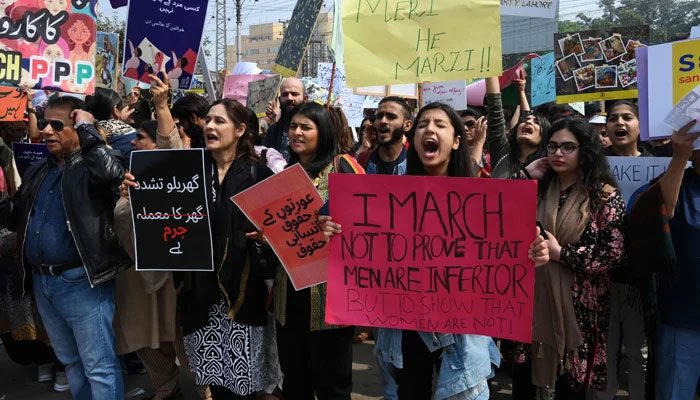Why should women march?
International Women’s D (IWD) is here and with it Aurat Marches in various cities around the country will take place
“Kuch Log Tumhay Samjhayein Gey/ Wo Tum Ko Khaof Dilayein Gey/ Jo Hai Wo Bhi Kho Sakta Hai/ Is Rah Mein Rehzan Hain Itnay/ Kuch Aur Yahan Ho Sakta Hai” – Fahmida Riaz
International Women’s D (IWD) is here and with it Aurat Marches in various cities around the country will take place, painstakingly and passionately organized by grassroots organizers and activists.
This time the day has come upon us at a time where a questionable election has taken place, where political opposition is still being targeted and freedom of speech and social media is under threat. It is a women’s day after the recent bravery and resilience of the Baloch women’s march and sit-in in Islamabad, led by the dynamic Mahrang Baloch, demanding the state to give them answers and return their missing brothers, fathers and sons from enforced disappearance.
The world beyond Pakistan also looks like it is at breaking point, with a devastated part of the Middle East now not just under a brutal occupation, but also actively bombarded and at the brink of famine, with women and children the overwhelming victims. Taking all this into consideration, IWD should be seen in light of the threats to personal and political freedom and the challenge to dissent and democracy. Now, more than ever, the need for intersectional feminism and collective feminist solidarity, especially with the Palestinian cause, is needed.
One of the simplest ways to describe intersectional feminism is to recognize the various and combined social identities we all possess – social class, gender, religious and ethnic background, which overlap and interconnect – and which contribute to the layers of discrimination we may face. When I am asked about women discriminated against in the legal system, I always say a rich, educated, well-connected woman in Pakistan is less disadvantaged, or at least discriminated against differently, than a poor man who encounters the same legal system to seek redress. Similarly, a poor woman from a Hindu background, like Daya Bheel, who was killed in December 2022, will be more prone to social and structured discrimination and violence.
Poor, non-Muslim citizens, women and men, are less able to access the police, the courts, or the media. And when powerful policymakers and politicians make decisions, regardless of their gender, they are less likely to take into consideration the interdependence of all these factors and how they affect the most vulnerable people. Globally, as well, Western governments’ rules-based order is dividing opinion in the Global South, which questions double standards on different conflicts – and this is a fundamental challenge for all progressive ideologies, including feminism.
One of the key things a feminist movement in Pakistan is, and should remain, is political. This is because feminism is intrinsically a political ideology; a de-politicized movement is not a feminist movement. De-politicized feminism is attractive to capitalist systems, where women don’t come together to question structural issues but instead gain and compete for economic and social status alongside men – a seat at the top table – all the while leaving the majority of women behind. It tears at the fabric of collective organizing on issues that address both structural and political that affect rural and urban communities. It wants women in the system – just women who are apolitical, who do not question.
The various Aurat Marches make well-thought-through and well-articulated demands, with their essence lying in challenging pre-existing political, social and economic structures that hold patriarchy and inequality at their very foundation and create unfair systems that disadvantage the majority of people. Aurat Marches demand freedom – azaadi – from sexual, domestic and cyber violence and harassment, poverty and enforced disappearance. They question the political process in the recent general elections. They make demands for the rights of minority citizens and ask for the reimagining of political participation, where oppressed communities take center stage.
Another important demand is the urgent need to break free from the IMF-loan cycle. I agree when Falesteeni feminists say: “The discourse on development and aid is nothing more than political subordination that aims to subject us, discourage our struggle and fragment its social foundation.” They of course apply it to the apartheid they are under yet the concept of aid and what it does to fracture collective struggle rings true for us as well.
Real change cannot be reimagined under the dictates of an IMF programme that keeps us in its never-ending cycle. Various demands surround the better electoral participation of women voters, with 10 million women still missing off the electoral roll. The demands and the issues highlighted by the various Aurat Marches are varied and they question state and society on behalf of all oppressed and vulnerable people, not just women. That is what intersectional feminism looks like.
The most controversial demand, the one many, mainly young men, like to challenge, is the demand for freedom. They ask us: freedom from what? To become Westernized, to not follow your religion, to dress as you please? These reductive arguments are missing the point but more dangerously, they help mobilize – based on a false comprehension of what Aurat March is and what it symbolizes – reactionary mobs that threaten the physical safety of Aurat March organizers and participants. They manage to set us back the little progress made in the way of mobilization and divert attention from the larger demands of seeking freedom from both political and social oppression and violence.
All year round, dedicated feminists and male allies speak truth to power and question the state on anti-women, regressive laws, policies and cultural norms. They question patriarchal, absolute power and seek its shift to the people. They demand that discriminatory laws be repealed and more importantly, dangerous legal precedents be set aside.
Only recently in the case against Bushra Bibi, the wife of Imran Khan, the court questioned the period of iddat observed by her before her second marriage. This judgment is not just against her, it is an affront to all women and threatens our freedoms. It sets back so much of the progress made by family courts in Pakistan and opens the floodgates where women can be questioned over such personal choices of marriage and divorce.
March 8 is an opportunity for all women and allies to celebrate the achievements made but also to join in and amplify the voice of those who work tirelessly for equality, freedom and justice for all women, and all persons who are disadvantaged, voiceless and marginalized. If you have any doubts about the remaining challenges that women and girls in Pakistan face, look at the tragedy and paradox of the Ichhra bazaar incident where the victim – a terrified woman targeted by a mob of men – and her rescuer, the calm and confident police officer, are both women.
Come also to speak up and show solidarity with a people being displaced and massacred with full impunity. The contradictions, the challenges, and the celebration, in Pakistan and elsewhere, are all part of the reason you should come out and march today on March 8. Come out and march for yourself and for future generations of women, girls and the marginalized of this country, who will ask us if we went out and claimed the streets.
I’ll end with how I started, with the powerful words of Fahmida Riaz who says: “Arre Kuch Aur To Aksar Hota Hai/ Par Tum Jis Lamhay Mein Zinda Ho/ Ye Lamha Tum Se Zinda Hai/ Ye Waqt Nahi Phir Ayega/ Tum Apni Karni Kar Guzro/ Jo Hoga Dekha Jayega”.
The writer is a lawyer and consultant. She tweets/posts @BenazirJatoi
-
 Shocking Details Emerge In Martin Short’s Daughter Katherine's Death Investigation: 'Kept To Herself'
Shocking Details Emerge In Martin Short’s Daughter Katherine's Death Investigation: 'Kept To Herself' -
 Yerin Ha On Stepping Into The Spotlight In Bridgerton Season Four
Yerin Ha On Stepping Into The Spotlight In Bridgerton Season Four -
 Nakiska Ski Area Avalanche Leaves Youth Unresponsive, Second Skier Escapes Unhurt
Nakiska Ski Area Avalanche Leaves Youth Unresponsive, Second Skier Escapes Unhurt -
 Igor Komarov Missing In Bali: Seven Foreign Suspects Arrested In Kidnapping Probe
Igor Komarov Missing In Bali: Seven Foreign Suspects Arrested In Kidnapping Probe -
 'I Swear' Director Kirk Jones Says Bafta Broadcast Mishap Failed Tourette’s Advocate
'I Swear' Director Kirk Jones Says Bafta Broadcast Mishap Failed Tourette’s Advocate -
 Yogurt Shop Murders Solved: 1991 Austin Cold Case Finally Linked To Serial Killer
Yogurt Shop Murders Solved: 1991 Austin Cold Case Finally Linked To Serial Killer -
 Iran Tensions Rise As Trump Says He Is 'not Thrilled' With Nuclear Negotiations
Iran Tensions Rise As Trump Says He Is 'not Thrilled' With Nuclear Negotiations -
 Where Is Calvin Klein's Wife Kelly Klein Now After Divorce And Fashion Fame?
Where Is Calvin Klein's Wife Kelly Klein Now After Divorce And Fashion Fame? -
 Kourtney Kardashian’s Role As Stepmother Questioned
Kourtney Kardashian’s Role As Stepmother Questioned -
 Neil Sedaka Dies At 86 After Hospitalisation In Los Angeles
Neil Sedaka Dies At 86 After Hospitalisation In Los Angeles -
 'Lizzie McGuire' Star Robert Carradine's Reason Of Death Laid Bare
'Lizzie McGuire' Star Robert Carradine's Reason Of Death Laid Bare -
 Lisa Rinna Breaks Silence After Recent Reunion With Andy Cohen: 'I've Pissed Him Off'
Lisa Rinna Breaks Silence After Recent Reunion With Andy Cohen: 'I've Pissed Him Off' -
 Savannah Guthrie Mom Update: Unexpected Visitors Spark Mystery Outside Nancy's Home
Savannah Guthrie Mom Update: Unexpected Visitors Spark Mystery Outside Nancy's Home -
 Elle Fanning Shares Detail About Upcoming Oscars Night Plan With Surprise Date
Elle Fanning Shares Detail About Upcoming Oscars Night Plan With Surprise Date -
 Demi Lovato Spills Go-to Trick To Beat Social Anxiety At Parties
Demi Lovato Spills Go-to Trick To Beat Social Anxiety At Parties -
 Benny Blanco Looks Back At The Time Selena Gomez Lost Her Handrwritten Vows Days Before Wedding
Benny Blanco Looks Back At The Time Selena Gomez Lost Her Handrwritten Vows Days Before Wedding




